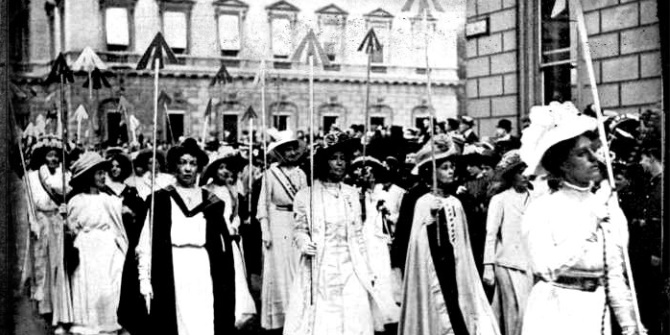
 A new movie documenting the struggle for women’s emancipation is a rarity; the suffragette movement is hardly ever dramatized for television. Shoulder to Shoulder, a BBC mini-series which is celebrating its fortieth anniversary, is the last time a story about the historic political struggle aired on TV. But why is the series buried in the BBC archive? Janet McCabe and Vicky Ball write that remembering this series is not only about reclaiming stories about the feminist struggle, but also about who has the power to tell them.
A new movie documenting the struggle for women’s emancipation is a rarity; the suffragette movement is hardly ever dramatized for television. Shoulder to Shoulder, a BBC mini-series which is celebrating its fortieth anniversary, is the last time a story about the historic political struggle aired on TV. But why is the series buried in the BBC archive? Janet McCabe and Vicky Ball write that remembering this series is not only about reclaiming stories about the feminist struggle, but also about who has the power to tell them.
Helena Bonham-Carter and Carey Mulligan recently marched through the corridors of parliament agitating for female suffrage during filming of the first commercial film to be shot inside the Palace of Westminster. In recreating what women did in that constitutional space to get the vote 100 years ago, Suffragette, written by Abi Morgan and directed by Sarah Gavron, brings that historic campaign back into public consciousness. While the struggle for emancipation shaped the political landscape in Britain in the early 1900s and changed irrevocably the position of women in society, it is a story that hardly ever makes it on to our screens; and it has been 40 years since we saw the suffragette movement last dramatized for television.
2014 marks the fortieth anniversary of the BBC mini-series, Shoulder to Shoulder, which focused on the activities of the Women’s Social and Political Union (WSPU), founded by Emmeline Pankhurst and her daughters, Christabel and Sylvia (1898-1918). It consisted of six specially written plays and it came about through the collaboration of three women: the actress Georgia Brown, filmmaker and feminist Midge Mackenzie and TV producer Verity Lambert. Its importance as a landmark BBC drama documenting the history of feminism and the emergent public voice of women is unquestioned. That said, the series seldom gets repeated and has never been released on DVD. This neglect prompts us to ask: why is such a politically important drama about women’s history still buried deep in the BBC archive?
It is well known that Emmeline Pankhurst was alive to the importance of capturing the media to help shape her political message; and some of the WSPU’s preoccupations—with the media, penal reform and direct action—chimed in with Britain in the early 1970s. The IRA bombing campaign (with the Price Sisters on hunger strike in Holloway prison—and forcibly fed), industrial strife and economic crisis meant that the series carried more than a whiff of controversy.
But maybe it was its feminism that lay at the heart of why Shoulder to Shoulder has been forgotten then and why we should remember it now. At the cast and crew reunion held at Birkbeck recently, both Siân Phillips and Angela Down, who play Emmeline and Sylvia Pankhurst respectively, admitted to knowing little about these women before making the series. While Phillips was politically active and involved in the trade union movement, she had no formal education about the Suffragettes.
She wasn’t alone. Midge Mackenzie spoke and wrote often of how the project grew out of her experience of filming the Golden Jubilee of Women’s Suffrage in 1968, when she discovered the story of how women won the right to vote had been “almost successfully erased from the history books. The women who fought for the vote had vanished from our history. Their writings were long since out of print and their newspapers buried in archives”. In good documentary fashion Mackenzie filled her book, which one feels was a response to the betrayal she somehow felt at having men write the TV series, with women’s voices—original experiences as expressed in the words of those taking part, from diaries, letters, memoirs, speeches, as well as newspaper reports and the Suffragettes own publications, Votes for Women and The Suffragette.
The series, like the book, focused on the militant campaign; but these Suffragettes were by no means the only campaigners demanding enfranchisement. Shoulder to Shoulder is a product of its time and, for example, it doesn’t address the contribution of other dedicated Suffragettes like Countess Markievicz, the first woman elected to Parliament, or Charlotte Despard, an Irish-based campaigner and Sinn Féin activist, for as Irish revolutionaries it probably was not the right time for reassessment as the troubles in northern Ireland still raged. And the non-violent, but constitutionally minded, Suffragists, led by Millicent Fawcett, barely got a look in either. But then committee work and letter writing is far less televisual than the drama of arson campaigns and bruising clashes with the police. What is rescued and recovered is not random, but the fragility of remembering the complexity of our history adds to ignorance and concealment.
But this is no excuse to forget Shoulder to Shoulder. Margaretta Jolly, Reader in Cultural Studies at the University of Sussex, has argued for using the Suffragettes to ‘measure new feminisms’ and of the importance of passing these stories onto the next generation, however difficult and contested. What the act of recovery from this entanglement of ‘official’ history and personal stories, public speeches and oral testimonies, teaches us is that the fight for equality didn’t end with enfranchisement—despite what post-feminism would have us to believe.
Remembering Shoulder to Shoulder isn’t only about reclaiming our stories, but about who has the power to tell them. Even within the production of the series there was a feminist struggle (of sorts) between an ideal and a challenging of power from the margins—Mackenzie, and a shattering of the glass ceiling and ability to change the script but from the inside—Lambert.
This remembering of the earlier fight for emancipation happened in the early 1970s at a time when a new feminism was struggling over questions of inequality, images of woman as Other and the culturally awkward position of women within the public sphere and their right to speak. Forty years later and we remain preoccupied with similar questions. Reconnecting voices and the experience of women and women’s history across time and space is crucial. Shoulder to Shoulder thus reminds us why the struggle still matters.
Note: This article gives the views of the authors, and not the position of the British Politics and Policy blog, nor of the London School of Economics. Please read our comments policy before posting. Image credit: Julie Jordan Scott
 Janet McCabe – Birkbeck, University of London
Janet McCabe – Birkbeck, University of London
Janet McCabe is Lecturer in Film and Television at Birkbeck, University of London
 Vicky Ball – De Montfort University
Vicky Ball – De Montfort University
Vicky Ball is Senior Lecturer in Cinema and Television Histories, De Montfort University







I remember watching Shoulder To Shoulder on PBS Masterpiece Theatre. It was in 1974. Excellent show. They need to bright back and make it available on streaming video.
I saw this series in 1974 when I was 15. I was incredibly affected by it even at that young age. I knew that I when I was old enough, I would always use my vote. Those brave women had fought, suffered and died for my right to do so. I have voted in every general election and by election ever since.
I am an American living in Los Angeles. Way back in the 1970’s PBS on US television broadcast “Shoulder to Shoulder”. It’s best program I ever saw. So, why no DVD? And why no DVD for US audiences. If properly marketed this series would make a ton of money. Can the copyright issues really be so daunting? I went to the Simply Media website based on rumor that the DVD for the series would be available there but no luck.
Release the DVD! I want to see this series again! “Shoulder to Shoulder” was brilliant! Release the DVD!
I could swear I saw this movie earlier than 1974, in 1969-1971.
At any rate, I was deeply moved by this series. I remember very vividly the scene where the woman was tube fed to end her hunger strike. I haven’t seen this series in decades, but it made such an impact on me when I was growing up.
The BBC is covering the centenary of the representation of the people act with much reference to the Pankhursts and (maybe) more to the suffragists. But no mention of Shoulder to Shoulder. it is blocked by You-Tube in this country (UK) and I can’t find the DVD – which I suspect never saw the light of day. This starts to look like censorship. But my friend Sheila and I remembered it vividly yesterday, and marched through the Park singing the March of the Women together!
Glad to see that this series is scheduled for DVD release by Simply Media on Jul 17th.
Simply Media TV have actually licensed to bring Shoulder to Shoulder out on DVD next year, so you should be able to see a DVD release of this soon – will hopefully be able to follow with more details later.
Shoulder To Shoulder changed the way I viewed the suffrage movement forever. Now that I teaching social studies cannot believe there is no way to see it.
Also cannot believe movie makers and writers of this story perpetuated use of the improper term “Suffragette.” The movement should be referred to as the “women’s suffrage” or “suffragist” movement. “Suffragette” was a derogatory and dismissive term used by men in power to insult these women – like Bobby Riggs calling someone a “women’s libber” in the 70s.
IIs there any way to buy a dvd of the miniseries or parts of it?
It is a great pity we do not hear more of Dame Ethel Smyth’s music etc. She deserves a series on her own. But there are issues about the Pankhurst led Suffragette end of the drive towards women’s suffrage in the late 19th and early 20th Century. There were others who had been and were working in different ways, not only in London, but in the provinces. I knew a number of ladies who were professional people, born in the period 1860 to 1880, educated and active in local affairs and life. They regarded the London inspired Pankhurst groups as people who delayed, damaged and compromised many others who had been making progress. The major and important criticism they made was that the Liberal Government elected in 1908 might well have moved at an early stage in matters of the vote and others. The Pankhurst extremism and antics made it impossible for them, electorally to do so. It is a “what if”, but if the Pankhurst’s etc. had not have happened women may have had the vote and other things a good deal earlier.